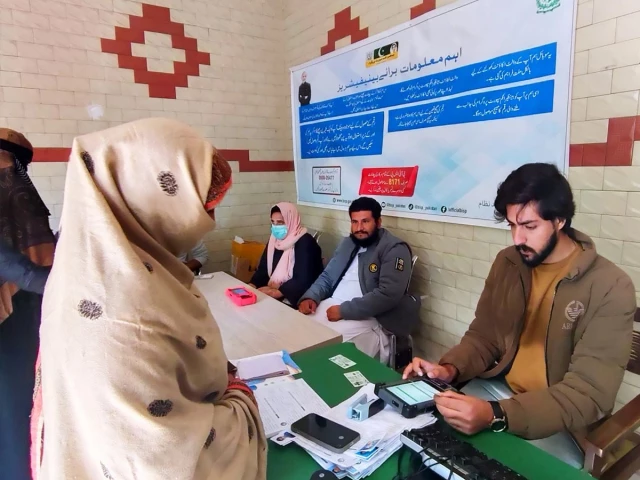Women must bring CNIC and phone to BISP’s Dynamic Registry Centers nationwide by December 31 to receive free SIMs
In Taxila tehsil of Rawalpindi district, free mobile SIMs are provided to eligible BISP women after biometric verification under the digital wallet system. Photo: x.com/bisp_pakistan
The government has taken a major step towards digitizing its social protection system as the Benazir Income Support Program has started distributing free SIM cards to its female beneficiaries across the country.
The ‘Social Protection Wallet’ initiative aims to give women direct and secure access to their financial assistance, replacing older systems that often involved long queues, cash handling and the risk of fraud. Once activated, the SIM will act as each recipient’s digital wallet, carrying all future BISP payments and official messages.
SIM distribution is carried out six days a week in a controlled and secure environment. Women have to bring their original CNIC and mobile phone to BISP’s Dynamic Registry Centers (DRCs) to receive the SIM card. Eligible women have been advised to collect their SIM cards from designated offices or campsites by December 31.
Once a SIM card is issued, BISP immediately activates the Social Protection Wallet on it. This means that women no longer need to rely on cash disbursement points or middlemen to receive their financial assistance. The digital system is designed to minimize the chances of fraud, increase transparency and give women more dignity and control over their financial support.
BISP Chairperson, Senator روبینه خالد کا main message:
কাস্তিক্তিন তান্তিক ক্র্ত্যান, বাজ্তা ক্র্য ক্যান কান কান কাস্য কাসান In the video, see how eligible women registered with BISP can get atin î.#BISP… pic.twitter.com/b8sVZZ9OmQ— Benazir Income Support Program (@bisp_pakistan) 17 November 2025
During the gradual rollout, the first phase began on November 17 in 41 districts across the DRC, where women received their free SIM cards after biometric verification. More than 5,700 SIM cards were distributed in the first 24 hours of the pilot launch, covering over 30 districts.
Future phases will expand the initiative further: Phase-II will begin on November 24 in another 53 districts, and Phase-III will begin on December 1 in 52 high-burden districts, with more camps per tehsil to manage the large number of beneficiaries.
In August, Prime Minister Shehbaz Sharif launched 10 million digital wallets for BISP beneficiaries, describing the move as a ‘historic milestone’ in Pakistan’s push towards transparency, financial inclusion and a cashless economy.
With a symbolic handshake, the Prime Minister inaugurated the system in the presence of federal ministers, BISP officials and international partners, including GIZ.
DGO MBISP Fawad Nawaz Kiani Pindi Bhattian is distributing free SIMs to deserving women at the camp sites established in Hafib Khaboob so that the social protection wallets of SIMS are open to women. BISP has issued clear instructions to women… pic.twitter.com/WxGTCkvdF7
— Benazir Income Support Program (@bisp_pakistan) 18 November 2025
He congratulated BISP chairperson Senator Rubina Khalid and the partner institutions for the “sheath mark decision that will protect genuine beneficiaries and protect them from undue hardship”.
The prime minister termed the launch as ‘a giant leap towards a cashless economy’ and recalled that during Ramazan, 78 percent of the relief package was successfully disbursed digitally despite skepticism and opposition from vested interests. “Cashless transactions are the urgent requirement of our time. They save time, eliminate corruption and bring efficiency, helping Pakistan in rapid progress,” he said.
About BISP
BISP is Pakistan’s largest social protection initiative. It provides financial assistance to low-income households, especially women, to help them meet basic needs such as food, health and education.
Launched in July 2008 by the Pakistan People’s Party government under then Prime Minister Yousaf Raza Gilani, the program was named after Benazir Bhutto and its core objective was to support the poor families after the sharp increase in food and fuel prices in 2007-2008. It covers about 10 million beneficiary households and operates nationwide through a network of 385 tehsil offices, 33 divisional offices, six regional offices and its headquarters in Islamabad.



